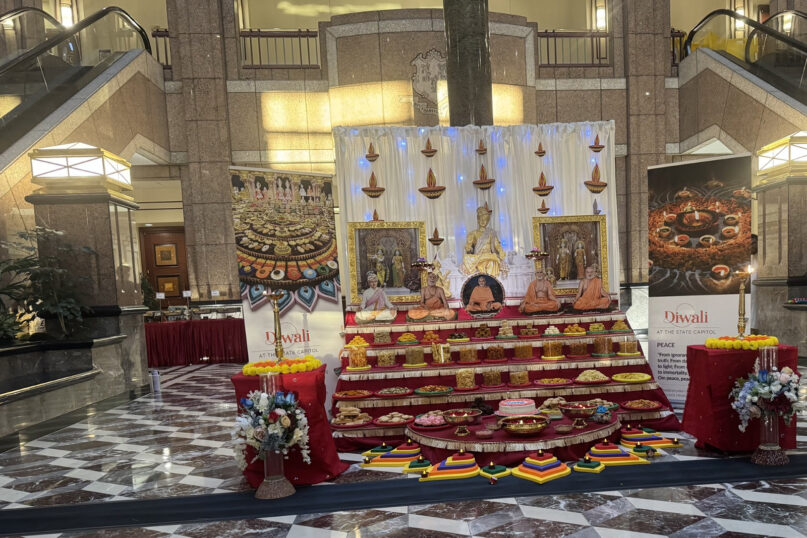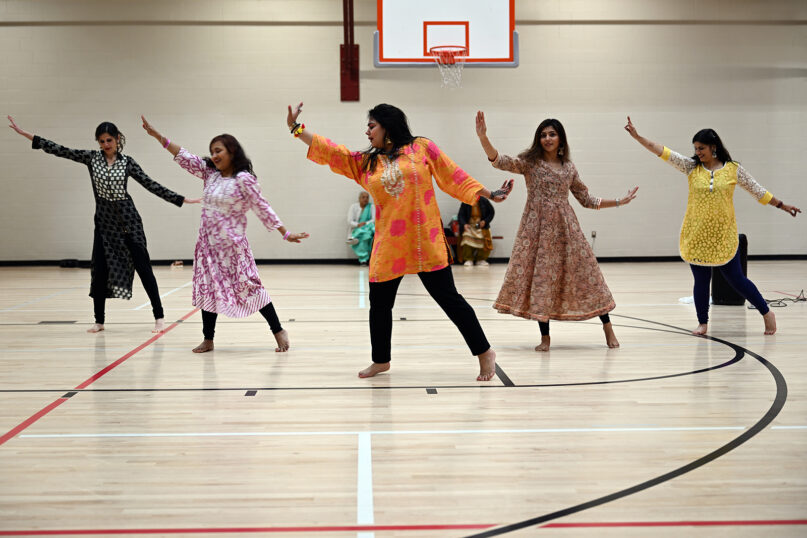(RNS) – During the late 1970s in the quiet suburbs of Hamden, Connecticut, the Indian festival of Diwali hardly enjoyed mainstream recognition. For Hindus like Rajeev Pahuja, who was born and raised in that environment, the fall holiday season meant balancing two worlds: football with his peers at school and celebrating Diwali with sparklers and his family privately.
“I didn’t get to celebrate as much when I was a kid,” said Pahuja, adding that he and his sister grew up “pretty strong-minded” as ethnic and religious minorities in the United States. “I am a guy who has lived my whole life as one side being Indian, and then one side being American.”
But in early 2024, emboldened by the seismic growth of the Indian American population in his home state, Pahuja set out to change that for future generations of Indians, Hindus and all those who celebrate Diwali in Connecticut. With no prior experience, the community leader successfully lobbied for the state’s recognition of Diwali as a holiday, this year to be celebrated on Oct. 20.
“We are the basketball capital of the world, we are the pizza capital of the world, and we will become the Diwali capital of the world,” Pahuja said after Connecticut Gov. Ned Lamont signed the bill in June. It went into effect Oct. 1.
The effort to gain state recognition for Diwali was an uphill battle, Pahuja said. He had to work around existing legislative barriers and explain to public officials why the holiday is so important to millions of Americans. There’s still a ways to go in education and visibility, especially in smaller states, Pahuja said, “but I think we’re starting to see that, and we’re going to get better at it.”

A Diwali celebration at the Connecticut state capitol, Thursday, Oct. 2, 2025, in Hartford, Conn. (Photo courtesy of Rajeev Pahuja)
As similar legislation was signed this week in California, three states — Connecticut, Pennsylvania and California — have now codified Diwali as a state holiday, offering a framework for excused absences or paid leave for students and employees who wish to celebrate. While it is a primarily symbolic designation that does not require schools and government offices to close, families in the diaspora say recognizing it signifies that South Asians belong in the American mainstream.
Aside from those three states, other cities and states have passed ceremonial “Diwali Day” recognitions, and in the case of New York City, public school closures.
Diwali, also known as its original Sanskrit form of Deepavali, is a major holiday in Hindu and other Dharmic traditions. Often called the festival of lights, many Hindus celebrate Diwali as the triumphant return of Lord Ram from his victorious battle with the demon Lord Ravana, after which the residents of Ayodhya lit hundreds of clay diyas, or lamps, to welcome Ram home. Other Hindus mark Diwali as the day Lord Krishna defeated the demon Narakasura, and others regard Diwali as the start of a new year brought by Goddess Lakshmi. Jains commemorate the nirvana, or spiritual liberation, of Lord Mahavira, and Sikhs celebrate Bandi Chhor Divas, when Guru Hargobind Ji was freed from imprisonment alongside 52 kings.
But each celebration of Diwali exemplifies a shared theme: that light can dispel darkness, truth can overcome ignorance and compassion can conquer fear. In India, many children get the week off from school, and families clean and decorate their homes, exchange gifts, wear new clothes and share feasts with one another.
On the opposite coast from Connecticut, California Gov. Gavin Newsom this week signed Diwali recognition into state law, fittingly, residents said, in time for this Diwali season. California boasts the highest population of Indian Americans in the country.
Samir Kalra, co-founder of the Hindu American Foundation, grew up in Fremont — the East Bay Area city known as a vibrant hub of Desi (South Asian) American life — celebrating Diwali with his peers, eating lots of sweets and “engaging the spirit of community.” But even as prominent as Diwali was in his hometown, the state holiday designation changes things, he said.
“As a father of two young girls, it’s really important,” he said, “because now, with the state officially recognizing this holiday, we can go to school districts and try to get schools to take the day off for Diwali every year. It will allow us as a family to be able to celebrate it without worrying about having them go to school, or (having) schoolwork, or they have to study and miss the celebrations, or kind of have to decide between the two and prioritize one or the other.”
The Hindu American Foundation, a national education and advocacy nonprofit, gave some institutional backing for the adoption of the holiday in all three states, mostly, said Kalra, to show lawmakers that the bills had widespread community support, offering testimonies by Hindu community leaders and letters to governors. The process is long and winding, Kalra said, as such bills must be amended and passed through multiple councils, committees and floor votes until they reach the governor.
Kalra said the California designation is “a sign that the Hindu American community is becoming more active, nuanced and sophisticated in how they’re able to push these initiatives beyond just the ceremonial resolutions.”
“These are actual legislation, and I think that shows that the community has come a long way in their political savvy and sophistication and advocacy prowess,” he said.
In 2024, Pennsylvania became the first state to designate Diwali as an official state holiday, thanks in part to Arvind Venkat, the first Indian American to serve in Pennsylvania’s state house and who helped write the bill.
“When I was growing up, Diwali was an important occasion, but it was something that was celebrated just among family members and close friends in the community,” he told RNS. “To now see the widespread celebration of Diwali, and to see it recognized by governments, I think, is really extraordinary. And it’s an example of our immigrant story.”

Women dance during a Diwali celebration in Pennsylvania in 2024. (Photo courtesy of Arvind Venkat)
For three years, Venkat has hosted a Diwali celebration for his constituents. But, he emphasized his state’s holiday win is not just for any one community. Pennsylvania has large Nepali and Bhutanese populations, which have their own version of Diwali, Tihar, at the same time.
“We’re actually recognizing a common theme in all of our communities,” he said, “especially here in Pennsylvania, where we take great pride in our founding by William Penn, and to be a welcoming place for all.”
And Indian Muslims like Razin Karu, executive director of the Pennsylvania governor’s advisory commission on Asian American and Pacific Islander affairs, also fondly look at Diwali as a time for community celebration, regardless of religious background. “It’s a thing that connected everyone in India,” he said. “It’s a great opportunity for folks to come together, have some good food and music and dance, and dress up nice in colorful clothing.”
“Diwali’s message is pretty universal,” he added. “It’s symbolizing the triumph of light over darkness, knowledge over ignorance, and hope over despair, and the fact that truth will ultimately always win. Those are values that are universal in every civilization, every part of the world, every religion. It’s great that we can all come together and celebrate these values and reaffirm each other that times may be dark, situations may get complex once in a while, but ultimately, there is hope.”
